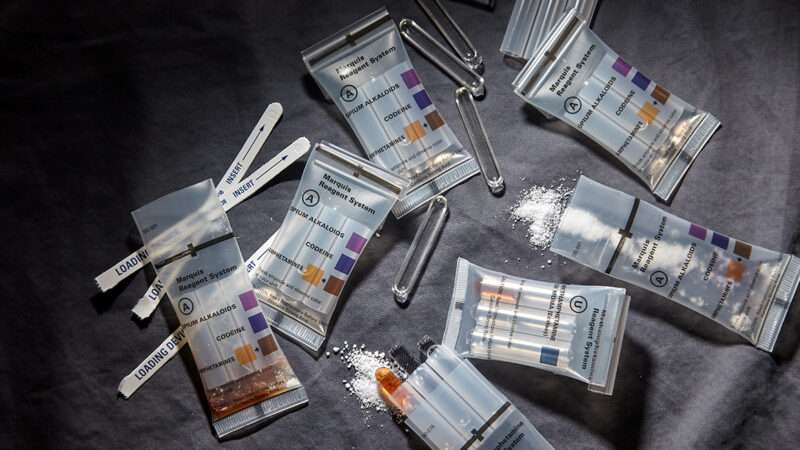
A new class action lawsuit accuses the Massachusetts Department of Corrections (DOC) of using a notoriously unreliable field test to detect contraband drugs. The suit argues that this has put people in solitary confinement for offenses they didn’t commit and led to public defenders being falsely accused of sending drug-tainted mail to their clients.
The lawsuit, filed in state court by Justice Catalyst Law and the law firm BraunHagey & Borden, says that the DOC uses tests developed by the company Sirchie to detect synthetic cannabinoids even though those tests have an error rate so high that they’re akin to “witchcraft, phrenology or simply picking a number out of a hat.”
“We brought this lawsuit to protect disempowered people incarcerated by the DOC from the unconscionable decision to use these tests in the face of overwhelming evidence of their inaccuracy,” Ellen Leonida, a partner at BraunHagey & Borden, said in a press release. “We also intend to hold the drug companies liable for knowingly profiting from the misuse of these tests and the misery they are causing.”
As Reason reported earlier this year, problematic drug field test kits are manufactured by several different companies and are used by police departments and prison systems across the country. The test kits use instant color reactions to indicate the presence of certain compounds found in illegal drugs, but those same compounds are also found in dozens of known licit substances.
Over the years, hundreds of wrongful arrests have been based on these field tests. Last year in Georgia, a college football quarterback was arrested after bird poop on his car tested positive for cocaine. In prison systems, where officials are trying to stop a flood of contraband drugs such as the synthetic cannabinoids known as “K2” or “spice,” inmates can be placed in solitary confinement and be stripped of good behavior credits, visitations, and other privileges.
The manufacturers warn that the results of these tests need to be verified, and Massachusetts prisons at least send all field tests to outside labs for confirmation. This eventually captures false positives, but it still leaves inmates to suffer in the meantime.
WBUR reported last October that more than a dozen Massachusetts attorneys said they had been falsely accused of sending drugs to their incarcerated clients, who were then put in solitary confinement for receiving legitimate legal mail. (One way K2 is smuggled into prisons is by lacing paper with it, which has led prison systems to crack down on outside mail and donated books.)
Criminal defense attorney Lisa Newman-Polk, also a plaintiff in the lawsuit, told WBUR that one of her clients was moved to a restrictive housing unit, lost his prison job, and couldn’t begin an education program after privileged legal mail she sent him tested “positive” for K2. A crime lab later invalidated those results.
“The fact that my client was just scooped up, kicked out of a really important college program that’s important for his reentry—it’s important for his mental health—and thrown into restricted housing for something he did not do, based on such feeble evidence, is wrong,” Newman-Polk told WBUR.
After poking around, Newman-Polk found 16 other attorneys were accused of sending drug-laced mail to clients.
Those tests aren’t even supposed to be used with paper samples, because the dyes and other chemicals in mass-produced paper can lead to inaccurate results.
“It’s just not designed to work that way,” Heather Harris, an assistant professor of forensic science at Arcadia University, told Reason. “Right off the bat, when you have a piece of paper and you pull out your field test kit, you’ve made the wrong decision. That’s not going to give you a reliable result.”
The well-known unreliability of these tests have led at least one state prison system to stop using them. Last summer, the New York Department of Corrections and Community Services (DOCCS) suspended use of Sirchie’s tests.
The New York State Correctional Officers & Police Benevolent Association, a union of state correctional workers, told local news outlets that DOCCS had found there were false-positive results with the testing kits being used to identify contraband drugs. “Inmates who were penalized for contraband drugs have been released from special housing units and their records were expunged,” The Auburn Citizen reported last August.
Despite this, these types of test kits are still widely used. And in the federal Bureau of Prisons, inmates have no legal right to request outside verification of a positive result, leaving them with no recourse to fight a bogus result.
Reason found one case where a federal inmate was put in solitary confinement for a month after some herbs that he kept in a pouch tested positive for amphetamines. The man convinced prison officials to send the suspected drugs to a real crime lab for verification. But the Bureau of Prisons hid the results for two years until a federal judge ordered it to respond to his lawsuit. The lab had found no drugs.
The class action lawsuit in Massachusetts asks a judge to declare that the DOC’s use of Sirchie’s NARK II tests on legal mail, and its punishment of inmates based on the results, violates incarcerated people’s constitutional right to due process and their right to legal counsel.
The DOC declined to comment on the lawsuit, citing the pending litigation. Sirchie did not immediately respond to a request for comment.
from Latest – Reason.com https://ift.tt/3rJauq3
via IFTTT